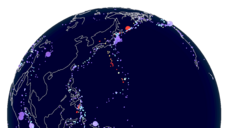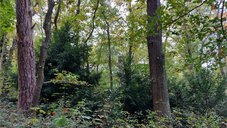Knowledge Transfer Projects 2025
Since 2024, the GFZ has been funding smaller knowledge transfer projects as part of an ideas competition with up to 10,000 euros. The activities have a duration of about one year. Various knowledge transfer formats will be implemented.
The following projects will be funded in 2025:
Data Driven Earth - Intuitive Visualization of Geodata
Project manager: Dr. Christian Meeßen
Project duration: May to August 2025
This project proposal aims to finalise selected use cases from the last ideas competition and bring them to production readiness. The focus is on the two viewers for globalwaterstorage.info and Earthquake Explorer.
globalwaterstorage.info: The interactive globe for GRACE satellite data on globalwaterstorage.info was designed and put online as part of the 2024 ideas competition. Remaining work could not yet be fully finalized. The project will aim to provide a robust and user-friendly platform for visualising global water resources.
Earthquake Explorer: The expertise for 3D data visualization of the GRACE satellite data will be made available in a second use case for the 3D visualization of the momentum tensors on the Earthquake Explorer website. This subproject is also to be realized within the framework of this application and will create an innovative way to visualize earthquake activity.
With both visualisations, we want to make a lasting contribution to scientific communication and to the public understanding of complex issues.
THMC modeling – summer school as an introduction to coupled THMC modeling for geoenergetic assessment of the subsurface
Project manager: Dr. Guido Blöcher
Project duration: June to August 2025
The aim of the project is to prepare and run of a summer school for thermal-hydraulic-mechanical-chemical simulations (THMC) with a complex, self-developed open source research software. The summer school will provide a multi-day hands-on experience in THC for building a model and modelling using the example of dolomitisation of limestone. In addition, during and after the summer school, a guide will be created from network generation (MeshIt software) to simulation and presentation of the results (Paraview software) will be produced. This will include a step-by-step presentation and will be made available to the user community.
The summer school will take place at the GFZ and will be conducted by 4 trainers. The maximum number of participants will be limited to 20. Virtual participation and a continuation of the summer school in the coming years are planned.
1) 3D data visualization in the web browser
Project manager: Dr. Christian Meeßen
Project duration: June to December 2024
The GFZ collects and processes a wide range of measurement data of the geosphere. Numerous different stakeholders inside and outside the GFZ and the scientific community have a great interest in using this data. This project is a first step towards a three-dimensional visualization of geodata. By building a modular framework, a demonstrator in the form of an interactive, static web viewer will be set up. The prototype will use data from the GRACE satellite missions, earth plates and volcanic areas provided by GFZ scientists.
One project result was successfully integrated into the information platform on global water availability: globalwaterstorage data monitor
2) Climate change at our doorstep
Project managers: Dr. Sibylle Itzerott, Dr. Theresa Blume, Manuela Lange
Project duration: May to December 2024
The GFZ has built up many years of expertise in forest health through research activities within the TERENO-Northeast platform. For this project, the knowledge will be harnessed for the forested Potsdam Telegrafenberg, the GFZ's main campus. With the help of ground-based measurements, remote sensing data and visualization instruments, the condition of the trees will be observed “ at our doorstep”, so to speak. The school laboratory at our center will be involved in the work in a participatory manner. The aim is to make the collected data available to the public via an online information tool and thus raise awareness of our immediate environment and a more sustainable way of acting.
3) Pathways to zero-emission heating in Brandenburg, a podcast
Project manager: Dr. Germán Bersalli & Dr. Franziska Mey (RIFS)
Project duration: May–December 2024
The core idea of this project is to critically discuss different options to decarbonize heating in Brandenburg
and diffuse the knowledge through a podcast. The podcast will integrate different perspectives
and experiences from scientists, energy providers and users and will inform about the opportunities and challenges in the transition to zeroemission heating.



